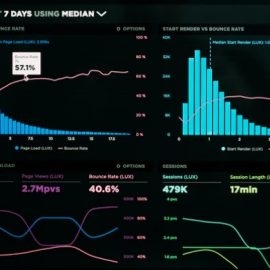

This article is an excerpt from the Shortform book guide to "The Sovereign Individual" by James Dale Davidson and Lord William Rees-Mogg. Shortform has the world's best summaries and analyses of books you should be reading.
Like this article? Sign up for a free trial here.
How does society change? What’s the biggest factor? Is societal change predictable?
Writing in the 1990s, James Davidson and William Rees-Mogg made major predictions about society’s future. They base them on what they call “megapolitics,” the theory that forms of government and economies are dictated mostly by circumstances, such as climate and the resources that are available.
Keep reading to understand Davidson and Rees-Mogg’s theory of how society changes.
Megapolitics: How The Economics of Force Shape Civilization
How does society change? Davidson and Rees-Mogg contend that civilizations throughout history have been shaped mostly by their circumstances, including environmental factors like climate and technological developments that create new ways of doing things. Thus, if you can understand how circumstances are changing, you can predict how society will change. This is the basis of their predictions for the rise of sovereign individuals and other changes in the 21st century.
According to Davidson and Rees-Mogg, the circumstances that dictate how people can make the most money impact society the most. This is because most people tend to do whatever they think will enable them to accumulate the most wealth. So, if circumstances change, creating a new way of earning money or changing which businesses are most profitable, society also will change as people adapt their behavior to increase their wealth.
Circumstances that affect the armed forces (such as weapons technology) are also highly significant in shaping society. And, factors that affect the armed forces also affect wealth, because armed forces are used either to protect wealth or to obtain it by force. In the authors’ view, taking wealth by force includes taxation, as well as armed robbery, protection rackets, extortion, and so on.
(Shortform note: In The 33 Strategies of War, Robert Greene takes this concept a step further, arguing that anything someone else does to coerce or manipulate you is, philosophically, an act of war—whether it’s the government compelling you to pay taxes, a salesman trying to manipulate you into making a purchase that benefits him more than you, or something else. Based on this premise, he explains how you can adapt military strategies for use in business or everyday life.)
Thus, if military technology and other relevant circumstances give large armies a decisive advantage over smaller forces, then civilizations will tend to coalesce into large nations that can field large armies. Similarly, if large businesses are more profitable because technology and circumstances dictate large economies of scale, then big businesses will become the norm as they out-compete smaller businesses. This was the case during the industrial age, which Davidson and Rees-Mogg identify as the period from AD 1500 to 2000.
But, if different technology or different circumstances make small businesses more profitable than larger ones, then big businesses will tend to fail or fragment while small ones take over the market. Similarly, if small armed bands can contend effectively with larger forces that take more resources to maintain, then sovereign states will tend to be small. Large nations, if they exist at all, will be more like loose coalitions of smaller sovereign entities. The authors contend that this was the case during the medieval period (which they identify as AD 1000 to 1500).
They also believe that new and soon-to-be-available technologies are changing circumstances to favor smaller entities again—both economically and militarily. This is why they expect that many nations will fragment into smaller sovereignties in the 21st century.
| Predicting Irrational Behavior In Predictably Irrational, psychology professor Dan Ariely argues that many models of human behavior and civilization are flawed because they assume that humans will make rational choices as they seek to better themselves. Davidson and Rees-Mogg’s theory of megapolitics arguably makes this assumption. Ariely contends that, actually, humans tend to make irrational choices, and these irrational choices follow predictable patterns. But, while Ariely’s perspective contrasts with Davidson and Rees-Mogg’s on how rationally humans will seek to better themselves, it corroborates the idea that humans respond predictably to circumstances. It also provides a mechanism to explain why societies often take longer to respond to changing circumstances than you might expect. For example, suppose a new technology undermines economies of scale by making it possible for an individual to produce a product one unit at a time for the same unit cost as a large factory, and with lower overhead. A perfectly rational company would adopt the new technology and dissolve its large factories to reduce overhead costs and thereby increase profits. However, many companies will respond in a predictably irrational way—because of the “endowment effect” that Ariely describes, people tend to overvalue what they already have—in this case, expensive factories. Thus, in practice, many manufacturers would miss the window of opportunity, only to be out-competed in the long run by small startups who adopted the new technology. Or suppose new communications technology enables armed forces to coordinate their activities better, increasing the advantage of larger armies over smaller ones. This makes it rational for small districts to merge or form military alliances with each other. But as leaders consider their options, Ariely explains that they will feel pressure to make decisions more on how these decisions will be perceived than how much benefit they will actually provide—again, a predictably irrational response. Perhaps they refuse some of the alliances that would have been most beneficial because of cultural biases or because they feel the need to preserve their national identity. This won’t negate the advantages of large army size that the new technology confers, and so, in the long run, civilizations will still tend to coalesce by merger, alliance, or conquest. But it will make the transition slower—and potentially more violent. Davidson and Rees-Mogg anticipate that the coming geopolitical changes will be accompanied by a lot of violence. And many of Davidson and Rees-Mogg’s predictions seem to be taking longer to come true than they predicted. Ariely’s insights into humans’ predictably irrational behavior help to explain the delay and provide additional reasons to expect that major changes may take place violently instead of smoothly. |

———End of Preview———
Like what you just read? Read the rest of the world's best book summary and analysis of James Dale Davidson and Lord William Rees-Mogg's "The Sovereign Individual" at Shortform.
Here's what you'll find in our full The Sovereign Individual summary:
- 1990s predictions on what the 21st-century economy would be like
- The idea that nations will eventually fragment into sovereign city-states
- The growth of cyber economies, computerized warfare, and virtual assistants






